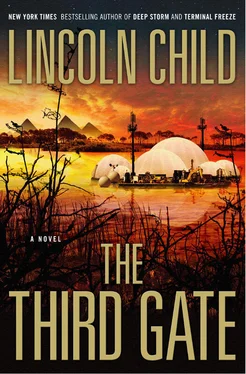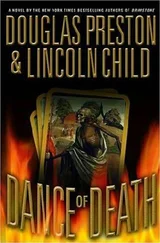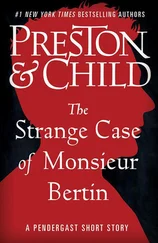Lincoln Child - The Third Gate
Здесь есть возможность читать онлайн «Lincoln Child - The Third Gate» весь текст электронной книги совершенно бесплатно (целиком полную версию без сокращений). В некоторых случаях можно слушать аудио, скачать через торрент в формате fb2 и присутствует краткое содержание. Жанр: Триллер, на английском языке. Описание произведения, (предисловие) а так же отзывы посетителей доступны на портале библиотеки ЛибКат.
- Название:The Third Gate
- Автор:
- Жанр:
- Год:неизвестен
- ISBN:нет данных
- Рейтинг книги:3 / 5. Голосов: 1
-
Избранное:Добавить в избранное
- Отзывы:
-
Ваша оценка:
- 60
- 1
- 2
- 3
- 4
- 5
The Third Gate: краткое содержание, описание и аннотация
Предлагаем к чтению аннотацию, описание, краткое содержание или предисловие (зависит от того, что написал сам автор книги «The Third Gate»). Если вы не нашли необходимую информацию о книге — напишите в комментариях, мы постараемся отыскать её.
The Third Gate — читать онлайн бесплатно полную книгу (весь текст) целиком
Ниже представлен текст книги, разбитый по страницам. Система сохранения места последней прочитанной страницы, позволяет с удобством читать онлайн бесплатно книгу «The Third Gate», без необходимости каждый раз заново искать на чём Вы остановились. Поставьте закладку, и сможете в любой момент перейти на страницу, на которой закончили чтение.
Интервал:
Закладка:
In the center of the room was a single research table, long and narrow, surrounded by a half-dozen chairs. The room had been so dark and still that Logan had believed them to be alone. But now, as his eyes adjusted, he noticed a man in Arab garb seated at the table, his back to them, hunched over an ancient scroll. He had not moved at their entrance, and did not move now. He appeared completely engrossed in his reading.
Rush took a step forward to stand beside Logan. Then he quietly cleared his throat.
For a long moment, the figure did not move. Then he turned slightly in their direction. The old man-for it was clear to Logan he was an elderly scholar-did not bother to make eye contact; rather, he simply acknowledged the new presences. He was dressed in a formal but rather threadbare gray thawb, with faded cotton pants and a hooded linen robe that partially concealed a plain black-and-white patterned ghutra fringing his forehead. Beside him, a tiny cup of Turkish coffee sat on a worn earthenware coaster.
Logan felt an inexplicable stab of annoyance at this presence. Rush had clearly brought him here to consult some private document: How were they going to keep their business confidential from an elderly scholar, even one who was so insolent as to barely acknowledge them?
Then-to Logan’s surprise-the old man pushed his chair away from the desk and, very deliberately, stood up to face them. He was wearing a pair of old reading glasses, cracked and dusty, and his seamed face was hidden behind the folds of the hood. He stood, regarding them, eyes indistinguishable behind the ancient spectacles.
“I’m sorry we’re late,” Rush said.
The man nodded. “That’s all right. This scroll was just getting interesting.”
Logan looked from one to the other in confusion. The stranger standing before them had replied in perfect English-American English, in fact, with the faintest whiff of a Boston accent.
Now, slowly and carefully, the old man pulled back his hood, revealing a shock of brilliant white hair combed carefully beneath the ghutra. He took off the glasses, folded them, and slipped them into a pocket of his robe. A pair of eyes stared back at Logan. Even in the faint light of the archives, they were as pale blue as a swimming pool on the first fresh day of summer vacation.
Suddenly, Logan understood. The man he was looking at was Porter Stone.
4
Logan took a step backward. He saw Rush’s hand approach his elbow and instinctively brushed it aside. Already the shock was passing, replaced by curiosity.
“Dr. Logan,” Stone said, “I’m sorry to surprise you like this. But, as you can no doubt appreciate, I am forced to keep the very lowest of profiles.”
He smiled, but the smile did not extend as far as his eyes. Those eyes were far more piercing, more brilliant, than the pointillist photo on the cover of Fortune had conveyed. Behind them clearly burned not only a fierce intelligence but an unslakable hunger-for antiquities or wealth or merely knowledge, Logan could not surmise. The man was taller than he’d expected. But the frame beneath the Arab garb was just as thin as the photos in the press had led him to believe.
Stone nodded to Rush. As the doctor turned to lock the door, Stone shook Logan’s hand, then gestured for him to have a seat. Logan drew no particular impression from the handshake-just a fierce energy out of keeping with such a gaunt frame and almost effeminate features.
“I didn’t expect to find you here, Dr. Stone,” he said as he sat down. “I thought you kept yourself far removed from your projects these days.”
“That is what I would like people to believe,” Stone replied. “And for the most part, it’s true. But old habits die hard. There are times even now when I can’t resist doing a little digging, getting my hands dirty.”
Logan nodded. He understood perfectly.
“Besides, whenever possible I prefer to talk personally to key members of a new team-especially on a project as important as this one. And of course, I was very curious to meet you face-to-face.”
Logan was aware the blue eyes were still scrutinizing him. There was something almost pitiless in their intensity: here was someone who had taken the measure of many, many men.
“So I’m a key part of the team?” Logan asked.
Stone nodded. “Naturally. Although, to be honest, I hadn’t expected you to be. You’re something of a late addition.”
Rush took a seat across the table from them. Stone put aside the scroll he’d been reading, revealing a narrow folder beneath it. “I knew of your work, of course. I’d read your monograph on the Walking Draugen of Trondheim.”
“That was an interesting case. And it was nice to be able to publish-I’m so rarely allowed to.”
Stone smiled his understanding. “And it seems we already have something in common, Dr. Logan.”
“Call me Jeremy, please. What might that be?”
“Pembridge Barrow.”
Logan sat up in surprise. “You don’t mean to say you read-”
“I did indeed,” Stone replied.
Logan looked at the treasure hunter with fresh respect. Pembridge Barrow had been one of Stone’s smaller, but historically more spectacular, discoveries: a burial pit in Wales that contained the remains of what most scholars agreed was the first-century English queen Boadicea. She had been found buried in an ancient war chariot, surrounded by weapons, golden armbands, and other trinkets. In making the find, Stone had solved a mystery that had plagued English historians for centuries.
“As you know,” Stone continued, “the scholarly elite always maintained Boadicea met her end at the hands of the Roman legions in Exeter, or perhaps Warwickshire. But it was your own graduate dissertation-in which you argued she survived those battles to be buried with full warrior’s honors-that led me to Pembridge.”
“Based on projected movements of Roman search parties far removed from the Watling Road,” Logan replied. “I guess I should feel honored.” He was impressed with Stone’s thoroughness.
“But I didn’t summon you here to speak of that. I wanted you to understand just what you’re getting yourself involved in.” Stone leaned forward. “I’m not going to ask you to sign a blood oath or anything so melodramatic.”
“I’m relieved to hear it.”
“Besides, somebody in your unique line of work can be trusted to keep a confidence.” Stone leaned back again. “Have you heard of Flinders Petrie?”
“The Egyptologist? He discovered the New Kingdom at Tell el-Amarna, right? And the Merneptah stele, among other things.”
“That’s right. Very good.” Stone and Rush exchanged a significant glance. “Then you probably know that he was that rarest of Egyptologists: a true scholar, endowed with a limitless appetite for learning. In the late 1800s, when everybody else was frantically digging up treasure, he was searching for something else: knowledge. He loved to stray from the obvious dig sites-the pyramids and the temples-searching far up the Nile for potsherds or bits of clay pictographs. In many ways, he made Egyptology a respectable science, discouraging looting and haphazard documentation.”
Logan nodded. So far, this was all relatively common knowledge.
“By 1933, Petrie was the grand old man of British archaeology. He’d been knighted by the king. He’d offered to donate his head to the Royal College of Surgeons so that his unique brilliance could be studied in perpetuity. He and his wife retired permanently to Jerusalem, where he could spend his twilight years among the ancient ruins he loved so much. And so the story ends.”
A brief silence fell over the archives. Stone pulled out the grimy spectacles, fiddled with them a moment, placed them on the table.
Читать дальшеИнтервал:
Закладка:
Похожие книги на «The Third Gate»
Представляем Вашему вниманию похожие книги на «The Third Gate» списком для выбора. Мы отобрали схожую по названию и смыслу литературу в надежде предоставить читателям больше вариантов отыскать новые, интересные, ещё непрочитанные произведения.
Обсуждение, отзывы о книге «The Third Gate» и просто собственные мнения читателей. Оставьте ваши комментарии, напишите, что Вы думаете о произведении, его смысле или главных героях. Укажите что конкретно понравилось, а что нет, и почему Вы так считаете.












